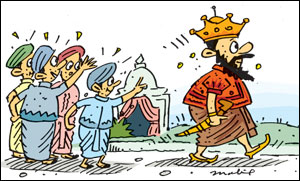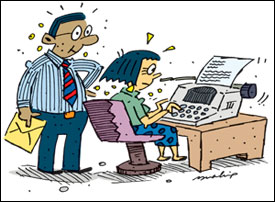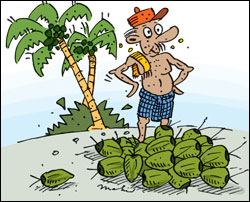|
 by R. S. Karunaratne
by R. S. Karunaratne
Many uses of 'long'
The word 'long' can be used as an adjective and an adverb. As an
adjective it is used to describe length and is gradable: long, longer,
longest.
"As an adjective
'long' shows a great amount of time.
There were long pauses in his speech.
The workers are now demanding longer
holidays.
|

Long live the king! |
The Mahaweli is the longest
river in Sri Lanka.
Some doctors work for long
hours.
There was a long line of
trishaws in the street.
Where is the world's longest
tunnel?
Nayana has long dark hair.
'Long'
is used to ask about duration.
How long have you been working as a teacher?
How long are you going to stay in Singapore?
'Long'
can be used to express a short period of time
It won't take long.
As an adverb 'long' means 'for a
great amount of time.'
Why did you take so long to type this letter?
Two hours may be too long to wait.
'Long'
can be used as a verb.
Mother is longing to see you. (=Mother wants to see you very much)
'Long'
is used with 'all' or 'whole' for emphasis.
We walked all day long.
Children played the whole day long.
'Long'
is used in many set phrases
'Long time no see'
is a humorous way of greeting a friend you have not met for a long time.
I went abroad, did a job and was fired. Anyway, it is a
long story (= complicated
story)
|

Why did you take so long to
type this letter? |
To cut a long story short,
when I returned home there was a stranger in my room!
(=to get to the point immediately)
Long ago, there was a
powerful king who had seven daughters. (= a long time ago)
At long last, we received
our passports. (= expression of relief)
Ruhunu Kumari will arrive before long
(= soon)
Hema no longer teaches English (= she used to teach English in the
past)
You will realise your folly of not sitting the examination in the
long run. (= in the future)
You can continue to work as long as you are healthy. (= on condition
that)
Long live the king! (=
showing support)
So long, we'll meet some
other day (goodbye)
Refugees received their long-awaited
shipment of food. (= waiting for a long time)
The Government and the LTTE had long drawn out peace talks. (=lasting
an unnecessarily long time)
We had to take down the notes in
longhand. (= to write by hand)
He greeted me like a long-lost
friend. (= someone he had not seen for a long time)
Starters
Writing direct quotations
The exact words spoken by a person are used as direct quotations.
Quotation marks ('....') or speech marks are used to separate the
quotation from the rest of the sentence.
Quotation marks are also known as inverted commas.
Ahmed said, "I wrote the essay."
"I have plucked some coconuts", Simon said.
|

“I have plucked some coconuts”, Simon said. |
"How many students passed the exam?" asked the principal.
"Twenty students have failed!" said the teacher.
The above sentences show that a direct quotation can come at the
beginning or at the end of a sentence. Note how the punctuation marks
are used.
The question mark (?) and the mark of exclamation (!) are placed
before the closing quotation marks. It is incorrect to use the
punctuation marks after the closing quotation marks.
When the speaker's name comes before the quotation, use a comma after
the verb.
Amara said, "I am going to the exhibition."
Use a comma after a statement
"We have won the battle," the General said.
Use a question mark for a question.
"Are you in grade 10?" she asked me.
Use an exclamation mark for an
exclamation.
"Save me!" pleaded the boy.
Avoidable common mistakes
Comprise
Do not follow 'comprise' with 'of'.
Four countries comprise the United Kingdom.
Fewer and less
Use 'fewer' with countable nouns.
Fewer than 100 graduates applied for the post.
Use 'less' with uncountable nouns.
I received less money than the other did.
Good and well
'Good' is always an adjective.
Good children respect their teachers.
'Well' is both an adjective and an adverb.
Sanath played well. (adverb)
I don't feel very well today. (Adjective)
Hard and hardly
'Hard' is an adjective meaning firm, stiff or solid.
The ground has been made hard by the drought.
'Hardly' is an adverb meaning scarcely or barely.
I hardly know him.
Therefore, do not say, 'I' can't hardly, wait for him.'
Do not use double negatives.
"I didn't do nothing' is wrong. Say, 'I didn't do anything.'
'I couldn't find him nowhere' is wrong.
Say, 'I couldn't find him anywhere.'
"What' is followed by a singular verb.
What we need is some more computers.
When 'what' is followed by a plural noun, the verb is also plural.
What books do you read? |

